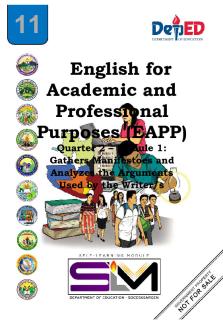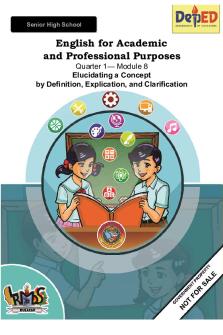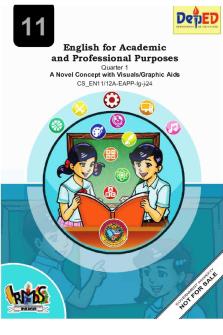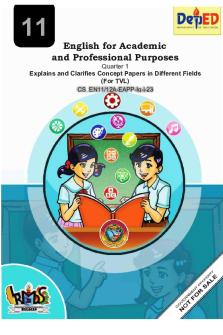EAPP- Q2- Module 1 - english PDF

| Title | EAPP- Q2- Module 1 - english |
|---|---|
| Author | Marie Sol Reyes |
| Course | English Major |
| Institution | Philippine Normal University |
| Pages | 22 |
| File Size | 1.3 MB |
| File Type | |
| Total Downloads | 806 |
| Total Views | 1,005 |
Summary
English forAcademic andProfessionalPurposes (EAPP)Quarter 2 – Module 1:Gathers Manifestoes andAnalyzes the ArgumentsUsed by the Writer/s11E-mail Address: [email protected] forAcademic andProfessionalPurposes (EAPP)Quarter 2 – Module 1:Gathers Manifestoes andAnalyzes the Arguments Used byth...
Description
11 English for Academic and Professional Purposes (EAPP) Quarter 2 – Module 1: Gathers Manifestoes and Analyzes the Arguments Used by the Writer/s
English for Academic and Professional Purposes 11 Self-Learning Module (SLM) Quarter 2 – Module 1: Gathers Manifestoes and Analyzes the Arguments Used by the Writer/s First Edition, 2020 Republic Act 8293, section 176 states that: No copyright shall subsist in any work of the Government of the Philippines. However, prior approval of the government agency or office wherein the work is created shall be necessary for exploitation of such work for profit. Such agency or office may, among other things, impose as a condition the payment of royalties. Borrowed materials (i.e., songs, stories, poems, pictures, photos, brand names, trademarks, etc.) included in this module are owned by their respective copyright holders. Every effort has been exerted to locate and seek permission to use these materials from their respective copyright owners. The publisher and authors do not represent nor claim ownership over them.
Development Team of the Module Writer: Niza B. Ponteras Editors: Louie Mark Garvida, Imelda C. Martinez, Jerryl Jean L. Salunayan Reviewers: Helen J. Ranan, Sally A. Palomo Illustrator: Reggie D. Galindez, Alona Rose L. Jimenea Layout Artist: John Arvin B. Genosa Cover Art Designer: Ian Caesar E. Frondoza Management Team: Allan G. Farnazo, CESO IV – Regional Director Fiel Y. Almendra, CESO V – Assistant Regional Director Romelito G. Flores, CESO V - Schools Division Superintendent Mario M. Bermudez, CESO VI – Assist. Schools Division Superintendent Gilbert B. Barrera – Chief, CLMD Arturo D. Tingson Jr. – REPS, LRMS Peter Van C. Ang-ug – REPS, ADM Gerardo Magno – Subject Area Supervisor Juliet F. Lastimosa - CID Chief Sally A. Palomo - Division EPS In- Charge of LRMS Gregorio O. Ruales - Division ADM Coordinator Ronnie R. Sunggay / Helen J. Ranan – Subject Area Supervisor / Coordinator
Printed in the Philippines by Department of Education – SOCCSKSARGEN Region Office Address: Telefax:
Regional Center, Brgy. Carpenter Hill, City of Koronadal (083) 2288825/ (083) 2281893
E-mail Address:
[email protected]
11 English for Academic and Professional Purposes (EAPP) Quarter 2 – Module 1: Gathers Manifestoes and Analyzes the Arguments Used by the Writer/s
Introductory Message For the facilitator: Welcome to the English for Academic and Professional Purposes –Grade 11 SelfLearning Module (SLM) on the MELC Gathers Manifestoes and Analyzes the Arguments Used by the Writer/s! This module was collaboratively designed, developed and reviewed by educators both from public and private institutions to assist you, the teacher or facilitator in helping the learners meet the standards set by the K to 12 Curriculum while overcoming their personal, social, and economic constraints in schooling. This learning resource hopes to engage the learners into guided and independent learning activities at their own pace and time. Furthermore, this also aims to help learners acquire the needed 21st century skills while taking into consideration their needs and circumstances. In addition to the material in the main text, you will also see this box in the body of the module:
Notes to the Teacher This contains helpful tips or strategies that will help you in guiding the learners.
As a facilitator you are expected to orient the learners on how to use this module. You also need to keep track of the learners' progress while allowing them to manage their own learning. Furthermore, you are expected to encourage and assist the learners as they do the tasks included in the module.
6
For the learner: Welcome to the English for Academic and Professional Purposes- Grade 11 SelfLearning Module (SLM) on the MELC Gathers Manifestoes and Analyzes the Arguments Used by the Writer/s! The hand is one of the most symbolized part of the human body. It is often used to depict skill, action and purpose. Through our hands we may learn, create and accomplish. Hence, the hand in this learning resource signifies that you as a learner is capable and empowered to successfully achieve the relevant competencies and skills at your own pace and time. Your academic success lies in your own hands! This module was designed to provide you with fun and meaningful opportunities for guided and independent learning at your own pace and time. You will be enabled to process the contents of the learning resource while being an active learner. This module has the following parts and corresponding icons: What I Need to Know
This will give you an idea of the skills or competencies you are expected to learn in the module.
What I Know
This part includes an activity that aims to check what you already know about the lesson to take. If you get all the answers correct (100%), you may decide to skip this module.
What’s In
This is a brief drill or review to help you link the current lesson with the previous one.
What’s New
In this portion, the new lesson will be introduced to you in various ways such as a story, a song, a poem, a problem opener, an activity or a situation.
What is It
This section provides a brief discussion of the lesson. This aims to help you discover and understand new concepts and skills.
What’s More
This comprises activities for independent practice to solidify your understanding and skills of the topic. You may check the answers to the exercises using the Answer Key at the end of the module.
What I Have Learned
This includes questions or blank sentence/paragraph to be filled in to process what you learned from the lesson.
7
What I Can Do
This section provides an activity which will help you transfer your new knowledge or skill into real life situations or concerns.
Assessment
This is a task which aims to evaluate your level of mastery in achieving the learning competency.
Additional Activities
In this portion, another activity will be given to you to enrich your knowledge or skill of the lesson learned. This also tends retention of learned concepts.
Answer Key
This contains answers to all activities in the module.
At the end of this module you will also find:
References
This is a list of all sources used in developing this module.
The following are some reminders in using this module: 1. Use the module with care. Do not put unnecessary mark/s on any part of the module. Use a separate sheet of paper in answering the exercises. 2. Don’t forget to answer What I Know before moving on to the other activities included in the module. 3. Read the instruction carefully before doing each task. 4. Observe honesty and integrity in doing the tasks and checking your answers. 5. Finish the task at hand before proceeding to the next. 6. Return this module to your teacher/facilitator once you are through with it. If you encounter any difficulty in answering the tasks in this module, do not hesitate to consult your teacher or facilitator. Always bear in mind that you are not alone. We hope that through this material, you will experience meaningful learning and gain deep understanding of the relevant competencies. You can do it!
8
What I Need to Know This module was designed and written with you in mind. It is here to help you master the competency on Gathering Manifestoes and Analyzing the Arguments Used by the Writer/s. Do you know that in our daily existence we are confronted with many social issues? Yes, we are. In fact, we also have our stand to that issues and oftentimes we try to convince other people to believe with our stand on that certain issues by providing support through evidence. In this module, you will learn to gather manifestoes and analyze the arguments used by the writer/s. Let us find out on the next lessons.
In this module, you will be able to identify some techniques on gathering manifestoes and analyzing arguments used by the writer/s. Specifically, you are expected to:
1. gather manifestoes and analyze the arguments used by the writers
9
What I Know Before we start the lesson, let us do the following activity to measure your prior knowledge on the topic that will be taught in this module. General Direction: Read each item carefully. Write the chosen letter on a separate sheet of paper. A. Multiple Choice Direction: Choose the letter of the best answer. 1. This refers to a published declaration of the intentions, motives, or views of the issuer, be it an individual, group, political party or government a. Law b. Texts c. Manifesto d. Arguments 2. This is a kind of writing where the students establishes a position in a given topic and then uses evidence to persuade the audience to see things from his/her point of view. a. Academic text b. Literary Writing c. Argumentative writing d. Comprehensive Writing 3. In academic writing, this is usually a main idea, often called a “claim” or “thesis statement,” backed up with evidence that supports the idea. a. concept b. question c. research d. argument 4. In analyzing an issue and developing an argument, the following may be included as supporting evidence EXCEPT; a. diaries b. current issues c. in-depth studies d. position papers and analyses
5. The following are the things to do to write a great argument, EXCEPT; a. make a diary of events b. make an educated stance c. investigate several sides of the argument d. collect evidence, including facts, statistics, and claims
10
B. True or False Directions: Write True if the statement is correct; False if it is wrong. Write your answer on the space provided before each number. _____1. In argumentative writing, a writer present an argument which is backed up with pictures. _____2. Argumentative writing gives both sides of the argument. _____3. Claim refers to the writers position on an issue. _____ 4. Forming and communicating claims on a certain issue supported by reasonable arguments and properly-cited factual evidences is a fundamental aspect in an argumentation. _____5. Manifestoes help you organize your stand on an issue and convince the people to change their mind about things which many of them are pretty firm about.
Lesson
1
Gathers Manifestoes and Analyzes the Arguments Used by the Writer/s Forming and communicating claims on a certain issue supported by reasonable arguments and
properly-cited
fundamental Gathering
aspect
factual in
manifestoes
an and
evidences
is
a
argumentation. analyzing
the
arguments used by the writers help you organize your stand on an issue and eventually will help you convince the people to change their mind about things which many of them are pretty firm about. For instance, you are going to convince the people on the healthy recovery from COVID 19, you will gather manifestoes and analyze the arguments used by the writers to convince the people on the issue. In this lesson, you will be taught to master the competency on gathering manifestoes and analyzing the arguments used by the writers.
11
What’s In In your previous module, you have learned the different graphic visual aids and the appropriate ways to use them. Before we proceed to the next topic, let’s check what you have learned from the previous lesson. Activity 1. MY GRAPHIC VISUAL AIDS LIST Directions: Complete the information needed in the table by filling in the description of the graphic visual aids listed below. Write your answer in a separate sheet of paper.
Graphic Visual Aids
Description
PowerPoint (or equivalent)
Overhead projector slides/transparencies
White or black board
Paper handouts
Flip chart
Video (DVD or VHS)
12
Notes to the Teacher As a facilitator you are expected to orient the learners on how to use this module. You also need to keep track of the learners' progress while allowing them to manage their own learning. Furthermore, you are expected to encourage and assist the learners as they do the tasks included in the module.
What’s New How are you coping with our lesson? I know you are eager to learn and discover new learning through the learning tasks that you are going to perform. This time, you will be engaged in an activity that will introduce you to our lesson. Activity 2. MY POINT OF VIEW Direction: Give your views on the image presented below and write it in a separate sheet of paper.
___________________________________________________________________________ ___________________________________________________________________________ ___________________________________________________________________________ ___________________________________________________________________________ 13
Are you convinced with the statement in the image? Why or Why not? __________________________________________________________________________________ __________________________________________________________________________________ __________________________________________________________________________________ If you were the person in the image, how are you going to convince others to have the same views as yours? __________________________________________________________________________________ __________________________________________________________________________________ __________________________________________________________________________________
What is It Now, let us study the concepts related to your activity. Manifesto. This refers to a published declaration of the intentions, motives, or views of the issuer, be it an individual, group, political party or government. Argumentative writing. A kind of writing where the students establish a position in a given topic and then use evidence to persuade the audience to see things from their point of view. To write a great argumentatively, the students first have to investigate several sides of the argument, which allows them to make an educated stance. Then, they have to collect evidence, including facts, statistics, and claims from experts in the topic’s field. Argument. In academic writing, this is usually a main idea, often called a “claim” or “thesis statement,” backed up with evidence that supports the idea. Analyzing an Issue and Developing an Argument Once your topic is selected, you should do some research on the subject matter. While you may already have an opinion on your topic and an idea about which side of the argument you want to take, you need to ensure that your position is well supported. Listing the pro and con sides of the topic will help you examine your ability to support your counterclaims, along with a list of supporting evidence for both sides.
14
Supporting evidence includes the following: Type of Information introductory information and overviews in-depth studies
Type of Source directories, encyclopedias, handbooks books, government reports
scholarly articles current issues
academic journals newspapers, magazines government agencies and associations association and institute reports
Statistics position papers and analyses
How to find these sources Use the Library catalogue
Library catalogue, Canadian Research Index, Government web sites Article indexes Article indexes Statistics Canada, Canadian Research Index, journal articles Library catalogue, web sites
What’s More You have already learned some concepts pertaining to gathering manifestoes and analyzing the arguments used by the writers. Now, let us check how far you have gone with our lesson.
Activity 3. ANALYZING SUPPORTING EVIDENCE Direction: In analyzing an issue and developing an argument, supporting evidence is a significant factor. Arrange the jumbled letters to form a word/s that connects to supporting evidence.
1. 2. 3. 4. 5.
TSASITCITS NI-PDEHT UTSSIDE RUCTERN SEUSSI CSOARHLYL RTACISEL LYAANESS
15
Activity 4. GATHERING MANIFESTOES Directions: Identify the possible types of sources of the supporting evidence for the following topic for argumentation. Write your answer on a separate sheet of paper. No.
Issue/ Topic
Type of Source
Specific Information (Copy the Links for Online Sources or title of the printed materials)
1
Violent Video games should be prohibited
2
Does Art pay?
3
Is Michael Jordan still a basketball star?
4
YouTube Owners Should Check and Fix Comments That Involve Filthy Language Influences of mobile phones: pros and cons
5
6
Are people becoming technological zombies?
7
Can you succeed in life working in the field of art? Are today's music tracks educational or meaningful at all? Is Bad Language Unacceptable on TV?
8
9
10
Is technology limiting creativity?
16
Activity 5. COMPLETING MANIFESTOES Directions: Choose ONE from any of the issues/ topics in Activity 4: Gathering Manifestoes and answer the following questions:
1. What is the issue/ topic? ________________________________________________ 2. What are the significant statements/ manifestoes did you get from the source you used? You may copy the exact statement here. _____________________________________________________________________ _____________________________________________________________________ _____________________________________________________________________ _____________________________________________________________________ _____________________________________________________________________ 3. Based on your answer in question number 2, what is your stand (agree or disagree) on the issue? Why or why not? _____________________________________________________________________ _____________________________________________________________________ _____________________________________________________________________ _____________________________________________________________________ _____________________________________________________________________
What I Have Learned You have come this far, Congratulations! You are truly doing a great job. Now, let us sum up what you have learned from our lesson by completing the given phrases below.
Activity 5. COMPLETE ME 1. An argument is…
___________________________________________________________________________ ___________________________________________________________________________ ___________________________________________________________________________ 2. Manifesto refers to …
___________________________________________________________________________ ___________________________________________________________________________ ___________________________________________________________________________ 3. A good argument is…
___________________________________________________________________________ ___________________________________________________________________________ ___________________________________________________________________________
17
What I Can Do Now that you are done sharing what you have learned from the discussion on the key concepts on gathering manifestoes and analyzing the arguments used by the writers, it’s time to do another activity. Activity 6: MY ARGUMENT Directions: People nowadays are living uncomfortably due to COVID -19 Pande...
Similar Free PDFs

EAPP- Q2- Module 1 - english
- 22 Pages

EAPP- Q2- Module 5 - english
- 20 Pages

EAPP Q2 Module 5 - Research
- 20 Pages

EAPP- Q1- Module 5 - english
- 23 Pages

EAPP-O.C.-summative-q2-
- 2 Pages

Final EAPP Q1 Module 8 - EAPP 11
- 30 Pages

EAPP-Module-2 - Module
- 28 Pages

Final EAPP Q1 Module 10 - EAPP 11
- 24 Pages

Final EAPP Q1 Module 9 - EAPP 11
- 22 Pages

Perdev Q2 Module 17 1
- 23 Pages

Q2 Q4 Module 1 21ST
- 15 Pages

3IS Q2 Module 1 - SADA
- 23 Pages

Contemporary Arts Q2 Module 1
- 21 Pages

EAPP Quarter 2 Module 5
- 70 Pages

Trends Q2 Module 3
- 32 Pages
Popular Institutions
- Tinajero National High School - Annex
- Politeknik Caltex Riau
- Yokohama City University
- SGT University
- University of Al-Qadisiyah
- Divine Word College of Vigan
- Techniek College Rotterdam
- Universidade de Santiago
- Universiti Teknologi MARA Cawangan Johor Kampus Pasir Gudang
- Poltekkes Kemenkes Yogyakarta
- Baguio City National High School
- Colegio san marcos
- preparatoria uno
- Centro de Bachillerato Tecnológico Industrial y de Servicios No. 107
- Dalian Maritime University
- Quang Trung Secondary School
- Colegio Tecnológico en Informática
- Corporación Regional de Educación Superior
- Grupo CEDVA
- Dar Al Uloom University
- Centro de Estudios Preuniversitarios de la Universidad Nacional de Ingeniería
- 上智大学
- Aakash International School, Nuna Majara
- San Felipe Neri Catholic School
- Kang Chiao International School - New Taipei City
- Misamis Occidental National High School
- Institución Educativa Escuela Normal Juan Ladrilleros
- Kolehiyo ng Pantukan
- Batanes State College
- Instituto Continental
- Sekolah Menengah Kejuruan Kesehatan Kaltara (Tarakan)
- Colegio de La Inmaculada Concepcion - Cebu
